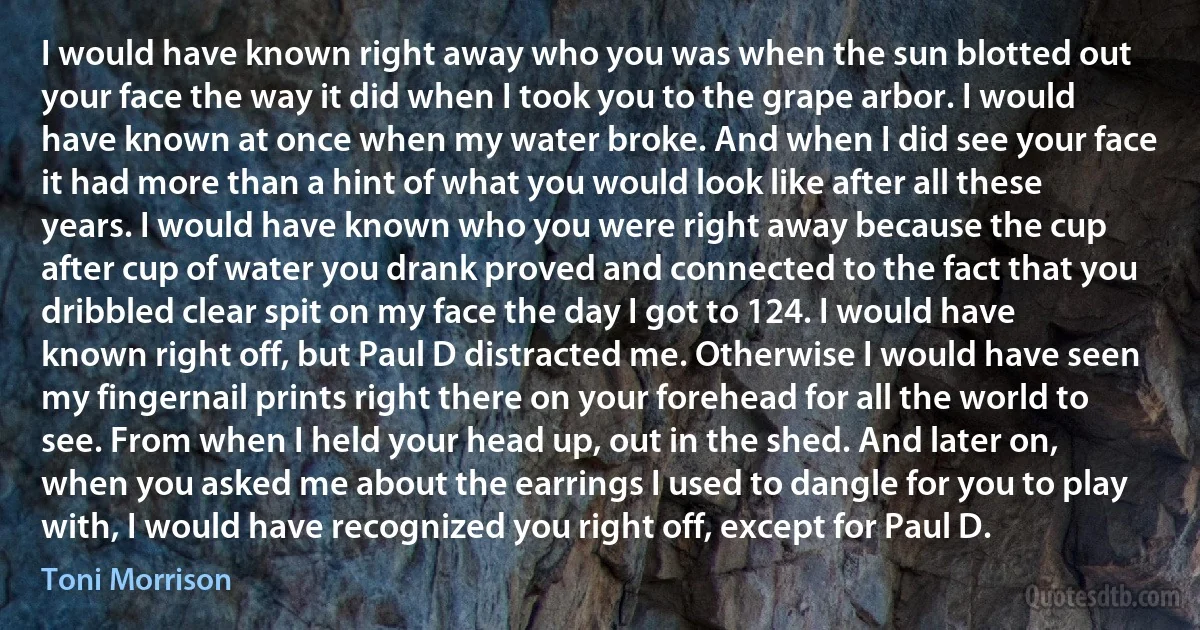
I would have known right away who you was when the sun blotted out your face the way it did when I took you to the grape arbor. I would have known at once when my water broke. And when I did see your face it had more than a hint of what you would look like after all these years. I would have known who you were right away because the cup after cup of water you drank proved and connected to the fact that you dribbled clear spit on my face the day I got to 124. I would have known right off, but Paul D distracted me. Otherwise I would have seen my fingernail prints right there on your forehead for all the world to see. From when I held your head up, out in the shed. And later on, when you asked me about the earrings I used to dangle for you to play with, I would have recognized you right off, except for Paul D.
Toni MorrisonRelated topics
broke clear cup dangle day face forehead grape head hold known later off once play right see seen shed spit sun take water way world yearsRelated quotes
Let us imagine that the aboriginal-original human specimen was one of two brother apes, A and B; they were alike in every respect; both were animal space-binders; but something strange happened to B; he became the first time-binder, a human. ... He had thus a new faculty, he belonged to a new dimension; but, of course, he did not realize it; and because he had this new capacity he was able to analyze his brother "A"; he observed "A is my brother; he is an animal; but he is my brother; therefore, I AM AN ANIMAL." This fatal first conclusion, reached by false analogy, by neglecting a fact, has been the chief source of human woe for half a million years and it still survives. ... He [then] said to himself, "If I am an animal there is also in me something higher, a spark of some thing supernatural."

Alfred Korzybski
For what advantage is it, that the world enjoys profound peace, if thou art at war with thyself? This then is the peace we should keep. If we have it, nothing from without will be able to harm us. And to this end the public peace contributes no little: whence it is said, ‘That we may lead a quiet and peaceable life.' But if any one is disturbed when there is quiet, he is a miserable creature. Seest thou that He speaks of this peace which I call the third (inner, ed.) kind? Therefore when he has said, ‘that we may lead a quiet and peaceable life,' he does not stop there, but adds ‘in all godliness and honesty.' But we cannot live in godliness and honesty, unless that peace be established. For when curious reasonings disturb our faith, what peace is there? or when spirits of uncleanness, what peace is there?

John Chrysostom
Don't forget that God sees you and watches you when you are in pain; He perceives even the beating of your heart. Consequently, He will not leave you without consolation and His fatherly protection. Naturally, the saints rejoiced in their afflictions; as for us, let us at least manage to accept affliction or pain patiently.
My child, pray within your heart, and the name of Jesus will become for you a comforting balm so that you can bear this trial of yours in a way which benefits you. You will greatly benefit from this trial if you submit yourself to it patiently. So again I say to you, with the almighty armor of prayer continually approach the omnipotent Lord more often, and you will come to know how He wondrously lifts the burden of pain and marvellously gives rest to sufferers.

Ephraim of Arizona
Comets are flying around the solar system. As they near the sun, they develop a tail as material is blown off by the solar wind. Most astronomers agree that comets cannot be more than 10,000 years old. They would have completely disappeared by now. Some scientists have recognized this as a serious problem for the theory that the earth is billions of years old, so they have proposed a new theory that new comets are constantly being introduced into the solar system to replace the old ones that burn out. They say they are coming from the "Oort Cloud.” No one has ever seen this Oort cloud, Oort never saw the Oort cloud! There is NO scientific evidence for its existence, but in their mind, this answers the serious problem the short lives of comets creates. There is a simpler answer, of course: the universe is NOT billions of years old!

Kent Hovind
First, I say, that woman in her greatest perfection was made to serve and obey man, not to rule and command him. As St. Paul does reason in these words: "Man is not of the woman, but the woman of the man. And man was not created for the cause of the woman, but the woman for the cause of man; and therefore ought the woman to have a power upon her head" [1 Cor. 11:8-10] (that is, a cover in sign of subjection). Of which words it is plain that the apostle means, that woman in her greatest perfection should have known that man was lord above her; and therefore that she should never have pretended any kind of superiority above him, no more than do the angels above God the Creator, or above Christ their head. [38] So I say, that in her greatest perfection, woman was created to be subject to man.

John Knox
